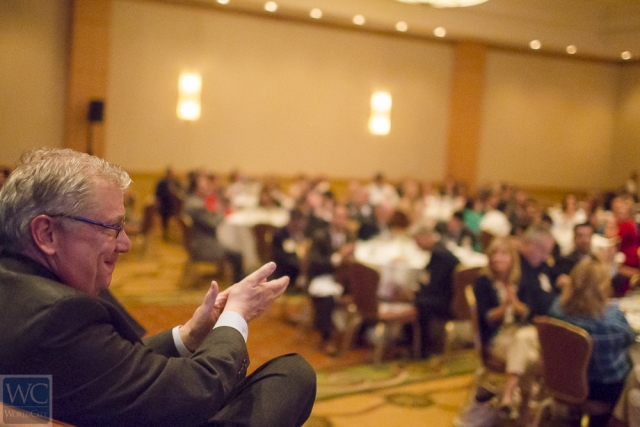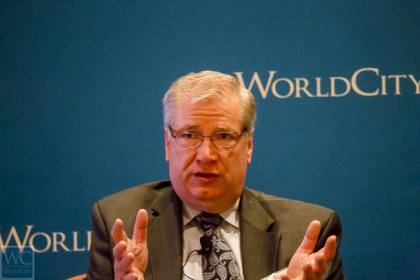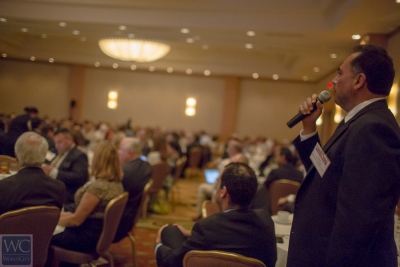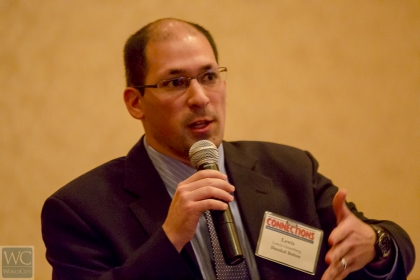What’s new in trade: Gold, parmesan cheese show complexity

To understand what’s new in trade these days, look no farther than gold and parmesan cheese.
A drop in the price of gold explains why South Florida trade fell last year from its record 2012 level.
And talks over the definition of parmesan – is it only cheese made in Italy’s Parmigiano-Reggiano region or also the U.S. kind sold in a green can? – may determine what goods South Florida sells abroad.
Both were among topics discussed May 1 at WorldCity’s Trade Connections, a luncheon event that kicked off local World Trade Month activities and unveiled WorldCity’s annual Miami Trade Numbers report. About 250 people attended.
What’s hot in international trade talks
John Melle, Assistant U.S. Trade Representative for the Western Hemisphere, offered participants an insider’s view of U.S. trade negotiations that aim partly to open markets for U.S. producers.
Cheese is a hot topic now, he said, because Central America is negotiating a free trade pact with the European Union. Europeans want special protections on goods they produce based on their place of origin like Italy’s parmesan.
But the United States, which already has a free trade pact with Central America, wants broader definitions, so that US. products sold with similar names still could be sold easily there.
“We are trying to protect our market share” and help U.S. exporters, Melle told a packed ballroom.
Melle described the U.S. Trade Representative’s office as a “very small federal agency,” made up of about 230 employees who handle all U.S. trade negotiations and help set Washington set trade policy. About 10 employees focus on Latin America, he said.
The trade job can be complicated, as a battle with Brazil over cotton shows.
It all began when Brazil sued at the World Trade Organization, alleging “unfair” U.S. government subsidies to U.S. cotton producers. Brazil won. Washington agreed to fix the problem, but officials said Congress first had to pass a new farm bill. Passing that bill could take years.
 Brazil said without redress, it would consider retaliation, possibly by acting against U.S. patents and U.S. copyrights. “And boy, is that a can of worms,” Melle said.
Brazil said without redress, it would consider retaliation, possibly by acting against U.S. patents and U.S. copyrights. “And boy, is that a can of worms,” Melle said.
To stave off reprisal, the U.S. administration agreed in 2010 to pay Brazil compensation until Congress acted: nearly $12.5 million per month. Brazil was paid during four years, or about $500 million, from the same funds that subsidize the U.S. cotton industry – until the farm bill was passed this year, said Melle.
“It’s the strange bedfellows you sometimes get” with trade, joked WorldCity President Ken Roberts.
Miami trade down in 2013, could dip in 2014
Roberts presented he new Miami Trade Numbers, a 68-page report filled with charts and statistics. report for 2013. Among its highlights: the South Florida area traded $120.49 billion in goods with the world last year, its second highest amount ever.
That total dipped 3 percent from 2012 levels, Roberts said, because of “a better global economy, oddly enough.”
Recovery pushed investors out of gold as a financial hedge, sending its price down. That slashed the value of the metal shipped through Miami from Latin America to such banking centers as Switzerland and the United Arab Emirates. Said Roberts: “The bubble has finally burst on gold.”
For 2014, lower gold prices also will pinch South Florida trade, as will changes in Costa Rica.
That small Central American nation ranked as South Florida’s No. 3 trade partner in 2013, thanks to its exports of computer chips from an Intel factory there. But Intel is shutting that plant and moving production to Asia. South Florida trade with Costa Rica started to shrink in early 2014, he said.
Ukraine, China, free trade and other concerns
Participants, many in import-export companies, had varied concerns over the future of commerce.
How will political problems between Russia and the Ukraine affect trade?, asked Juan Gallardo, a principal with Hickey & Associates.

Juan Gallardo, a principal with Hickey & Associates.
The impact could be “huge,” said Melle. So many countries in Europe depend on Russia for fuel, and if Ukraine problems reduce fuel shipments, global prices for fuel could rise.
Which U.S. free trade agreements are working well, which are not, and where is free trade going?, asked Carol Ellis-Cutler, senior vice president and partner in Colliers International.
Free trade agreements, or FTAs, generally are helping to boost U.S. sales and integrate U.S. business more with partner countries, said Melle. U.S. exports to FTA partner nations rose about twice as fast as U.S. exports as a whole in recent years. Moreover, two decades after the start of free trade with Mexico, about 40 percent of what the United States buys Mexico is actually U.S. components, said Melle.
How will China’s becoming the world’s largest economy affect trade?, asked Dean Leaman, business development manager for imports at Certified Laboratories.
The United States is trying to integrate China more into the world trade system, Melle said. China is not now part of the proposed Trans-Pacific Partnership, because Beijing does not yet meet the tough standards required.
Many companies face hurdles to bring back profits in dollars from Latin American nations including Venezuela. What is the U.S. Trade Representative doing about that problem?, asked Susan Walker, general manager of the Miami office of foreign exchange specialists AFEX.
Countries that share free trade agreements with the United States don’t have those problems, because repatriation issues are addressed in the accords. Melle said. The problems come with those countries that don’t have FTAs, such as Venezuela.
An evolution on environmental issues in trade
How are environmental issues being addressed within trade agreements?, asked Lewis Greenberg, director of marketing for accounting firm Daszkal Bolton.

Lewis Greenberg, director of marketing for accounting firm Daszkal Bolton.
There’s been a steady evolution since 1994 when environmental questions were first included in the North American Free Trade Agreement, Melle said. In the Trans-Pacific Partnership, member nations are being asked to live up to standards in international agreements, not their own environmental laws.
Trade Connections is one of six event series organized by WorldCIty to bring together executive sin greater Miami on international business topics. The trade series is sponsored by PortMiami, American Airlines Cargo and Miami-Dade County Aviation.
The next Trade Connections meeting is set for June 20 on “Brazil: Miami’s No. 1 trade partner.”

